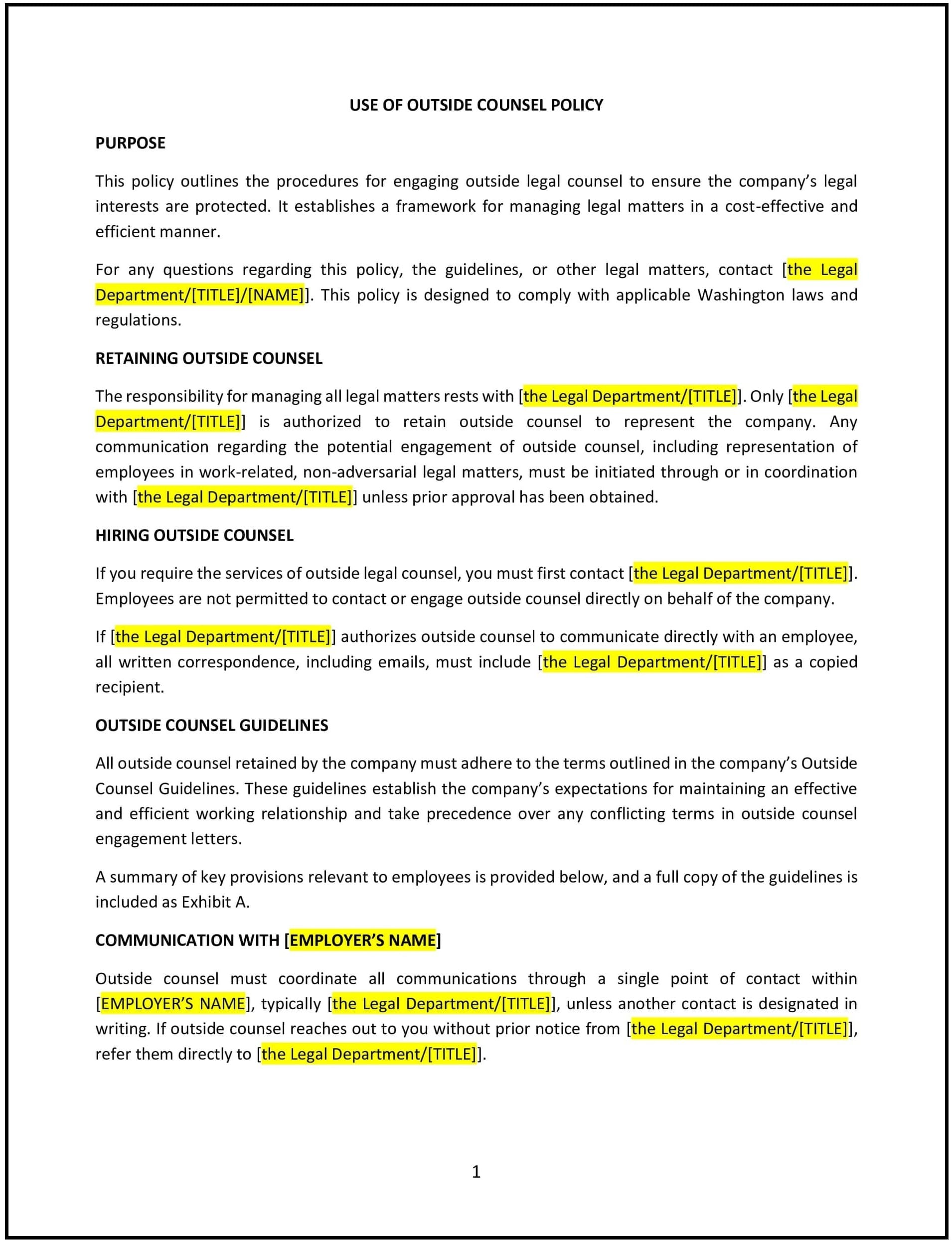Got contracts to review? While you're here for policies, let Cobrief make contract review effortless—start your free review now.

Customize this template for free
This outside counsel policy is designed to help Washington businesses manage the use of external legal counsel and establish clear guidelines for engaging outside law firms or attorneys. The policy outlines the process for selecting outside counsel, the scope of their engagement, and the expectations regarding legal fees, billing practices, and performance. It ensures that the use of outside counsel is consistent with the company’s business objectives, compliance requirements, and budget considerations.
By adopting this policy, businesses can manage their legal costs, ensure effective legal support, and establish a framework for selecting and managing external attorneys in a way that aligns with the company’s legal and financial interests.
How to use this outside counsel policy (Washington)
- Define the circumstances for using outside counsel: The policy should specify the situations in which the company may engage outside counsel, such as handling specialized legal matters, managing conflicts of interest, or addressing workloads that exceed the internal legal department's capacity.
- Establish guidelines for selecting outside counsel: The policy should outline the criteria for selecting outside counsel, including experience, expertise, reputation, and cost-effectiveness. It should also specify whether firms must be pre-approved or if the company can select counsel on a case-by-case basis.
- Clarify billing practices and fee structures: The policy should set clear expectations regarding billing practices, including whether outside counsel will bill hourly rates, flat fees, or other billing arrangements. It should specify the approval process for fees, any caps or limits on fees, and the need for regular updates on billing statements.
- Address confidentiality and data protection: The policy should require outside counsel to maintain confidentiality regarding the company’s legal matters, business information, and client data. It should specify the confidentiality agreements and data protection measures that outside counsel must adhere to.
- Set performance expectations: The policy should establish performance expectations for outside counsel, such as timely delivery of legal services, regular communication with the company’s internal legal team, and the provision of regular status reports on ongoing matters.
- Ensure compliance with Washington state and federal laws: The policy should ensure that the engagement of outside counsel complies with Washington state laws, including regulations governing attorney-client privilege, and federal laws that may impact legal matters or the use of external legal support.
- Review and update regularly: Periodically review and update the policy to ensure it remains compliant with Washington state laws, federal regulations, and any changes in company operations. Regular updates will help ensure the policy stays relevant and effective.
Benefits of using this outside counsel policy (Washington)
This policy offers several benefits for Washington businesses:
- Reduces legal costs: By setting clear guidelines for selecting outside counsel and controlling billing practices, the policy helps businesses manage and reduce their legal expenses. This can lead to more cost-effective use of legal services.
- Improves legal outcomes: The policy helps businesses select the most qualified outside counsel for each matter, ensuring they receive high-quality legal support. This improves the likelihood of favorable outcomes in legal matters.
- Enhances internal controls: The policy establishes clear processes for engaging, monitoring, and evaluating outside counsel, ensuring that the company has proper oversight of external legal expenses and performance.
- Promotes transparency: Clear expectations for billing and performance help foster transparency in the relationship between the company and outside counsel. This minimizes misunderstandings and ensures that the company gets value for its legal spending.
- Supports compliance: The policy ensures that the use of outside counsel supports compliance with Washington state and federal laws, reducing the risk of legal or regulatory issues that could arise from improper legal practices or non-compliance.
- Strengthens the attorney-client relationship: By defining the scope and terms of the engagement, the policy helps businesses establish strong, professional relationships with outside counsel, ensuring effective collaboration and communication.
Tips for using this outside counsel policy (Washington)
- Communicate the policy clearly: Ensure that all relevant employees, especially those responsible for selecting or managing outside counsel, are familiar with the outside counsel policy. Include the policy in the employee handbook and review it periodically with key personnel.
- Evaluate outside counsel regularly: Monitor the performance of outside counsel to ensure they are meeting the company’s expectations for quality, cost, and timeliness. This may include regular meetings or status updates to ensure that the legal team is aligned with business objectives.
- Set clear budget expectations: Work with outside counsel to establish a clear budget for each engagement, including specific billing arrangements, and set up a process for regular updates on expenditures. This can help prevent legal costs from exceeding expectations.
- Maintain proper documentation: Keep thorough records of all engagements with outside counsel, including contracts, billing statements, and communications. This helps align with internal policies and provides a clear audit trail for future reference.
- Ensure confidentiality and data protection: Require outside counsel to sign confidentiality agreements and adhere to data protection policies to safeguard the company’s sensitive information. This helps protect intellectual property and legal privileges.
- Review and update regularly: Periodically review the policy to ensure it remains compliant with Washington state laws, federal regulations, and any changes in the company’s operations. Regular updates will help keep the policy relevant and effective.